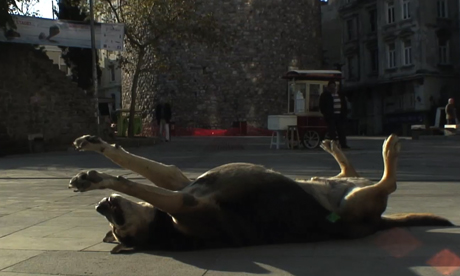Urban animals the focus of artist Andrea Luka Zimmerman’s film Taskafa

A still from Taskafa: Stories of the Street. Image: Andrea Luka Zimmerman
“One gets a little bored of seeing only humans,” says one of the interviewees in Andrea Luka Zimmerman’s film Taskafa: Stories of the Street.
Zimmerman shares this sensitivity towards the other inhabitants of cities – feral dogs, cats, pigeons, gulls and the like – and her interest in these urban animals even led her to temporarily release goats onto the Haggerston and Kingsland Estate, her home for 17 years, as part of an artistic project.
The 44-year-old is interested social housing and is due to take part this month in a Barbican event about council estates alongside authors Will Self and Lynsey Hanley.
She has been documenting the ongoing, fazed demolition of the Haggerston and Kingsland Estate, where she still has a studio, but her 66 minute “very low budget” film was inspired by a visit to Istanbul, where for hundreds of years tens of thousands of feral dogs brought to the city by Turks from central Asia have lived among its human residents.
‘Forced out’
Now that figure is down to the hundreds because of removal and steralisation programmes carried out by the municipality, but in many old neighbourhoods – including religious ones – the dogs are still treasured and respected, and are the source of many urban myths.
“I had been walking around Istanbul, and there was a feeling I had in that city which I had not had in other cities,” explains Zimmerman. “I kept thinking, why is that? And then I realised it was because of the sleeping dogs and the fact that people could touch them.
“Bill McAlister, the co-producer, had wanted for years to make film about street dogs, because when he was in Istanbul he went to Galata and was accosted by the dogs.
“He couldn’t walk through the square and was quite scared and he also thought, these poor street dogs, they should be in homes or shelters, like a lot of Westerners think. Then a taxi driver set him straight and told him, no, these dogs help protect the square and are looked after by everyone here.”
Zimmerman’s touching film – which is being screened at Hackney Picturehouse and the British Film Institute next month as part of the London Film Festival – is narrated by John Berger, whose novel King is told through the eyes of a dog.
The documentary shows placid street dogs forming special relationships with the homeless and blind people as well as with shopkeepers and residents of the streets they share.
“We’d just stand by a dog and suddenly people would come from all directions and say things like: ‘This dog is like an old grandfather to us. We don’t know what we’d do if something were to happen to him.”
Zimmerman believes shared public spaces must be shared with animals too – but at various times in Istanbul’s history property developers and the city’s government have not seen things this way.
Howling Island
“Dogs sometimes get poisoned of beaten,” says Zimmerman. “At one point in the last century they were rounded up and exiled to an island where there was no food and were left to eat each other.
“People called it Howling Island because whenever the wind blew they could hear the dogs’ howls.
“Removal of dogs to this island happened twice, and both times there were big fires in the city shortly afterwards.
“People said that if the dogs had been there, they would have warned everyone. Eventually some residents hired boat people to secretly go to the island to collect the dogs and bring them back.
Zimmerman says she is interested in the fate of Istanbul’s street dogs because “it’s a whisper of what we do to people”, a metaphor for the steralisation of our streets and an example of our tense relationship with animals and nature.
Or as an interviewee in Zimmerman’s film puts it: “Humans are wild. We kill people and animals and destroy nature. Is there anything more savage than that?”
Taskafa: Stories of the Street is being screened at Hackney Picturehouse, 270 Mare Street, E8 1HE, on October 16 at 6.30pm, and the British Film Institute (BFI) Southbank, Belvedere Road
South Bank, SE1 8XT on October 18 at 9pm
